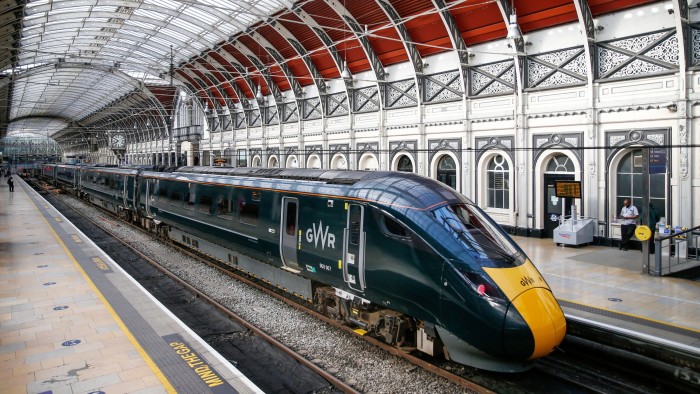Unlock the Editor’s Digest for free
Roula Khalaf, Editor of the FT, selects her favourite stories in this weekly newsletter.
A senior UK Whitehall official has made a rare intervention to pressure the rail sector’s independent regulator to limit approvals for new “open-access” train operations, saying they would cost taxpayers too much.
The move could affect efforts by FirstGroup, Sir Richard Branson’s Virgin Group, Arriva and the trainmaker Alstom to start services linking places that are poorly served by existing rail franchises or public sector train operators.
Open-access operators are privately run rail companies that run services on the national rail network without government contracts or public subsidies.
To gain approval to operate new routes, they must demonstrate to Network Rail, the rail infrastructure owner, that there is space on the network for their services. They also need to gain approval from independent regulator, the Office of Rail and Road (ORR).
Richard Goodman, the Department for Transport (DfT) director-general for rail reform and strategy, last week wrote to the ORR demanding it make it harder for future applications to gain approval.
In a letter, which the ORR posted on its website, Goodman argued that if the regulator approved all the outstanding applications, franchised and public-sector train operators would lose out as passengers diverted to the new services.
This would cost franchised and public-sector operations £229mn in annual revenue, he wrote.
He went on to demand the regulator “strengthen its assessment methodology” to take such damage into account and requested that the change should be “enacted immediately”.
Transport secretary Heidi Alexander has insisted that open-access services will be allowed to continue even after the government takes control of all the remaining operations run by private-sector companies under franchises awarded by it. Seven former franchises are already run by the public sector.
The only existing open-access operations are FirstGroup’s Hull Trains, linking London and Hull; Lumo, linking London and Edinburgh; and Arriva’s Grand Central, linking London to Sunderland and Bradford.
FirstGroup has already secured approval to run two open-access routes — between London Paddington and Carmarthen in Wales and between London Euston and Stirling in Scotland — but is yet to launch these services.
In a response to the DfT letter, sent on Saturday, managing director of FirstGroup’s rail operations Steve Montgomery, expressed concern about the DfT’s approach, pointing out the ORR was about to make final decisions on the applications for open-access operator licences before it.
The DfT declined to comment beyond last week’s letter.
The ORR is to rule on FirstGroup requests to launch services between London and Rochdale and between London and Sheffield. It has further applications pending for services between London and Hereford and London and Paignton.
“It is very unusual for a stakeholder to seek to influence the process at such a late stage in the consideration,” Montgomery wrote.
He added that the letter seemed to be “at odds with the DfT’s expressed support for open-access services”.
Montgomery argued that his company’s open-access operations had generated new revenue for the rail sector, rather than taking it from franchised services.
Arriva said that its licence applications, including one to link Newcastle and Brighton directly, would use “underutilised capacity” to enable “even more people to travel sustainably”.
Virgin or Alstom did not immediately respond to a request for comment.
The ORR said its final decisions would explain how it had considered views from all stakeholders, including the DfT.




